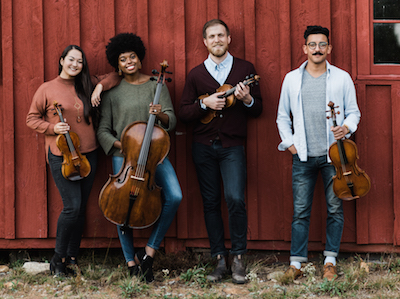
ELECTRONICS ENTERING STRING QUARTET WORLD
Vincent Calianno’s world-premiere string quartet was considerably more than four players given its bonus offering: added prerecorded tracks of electronics, voices, and even more string sounds.
Entitled “A History of the String Quartet in its Natural Habitat,” this catalogue traces the evolution of both media—chamber music as well as electronic enhancement—starting stylistically about 1900, going from fully structural to aleatoric music to the present times. Calianno, 39, offers a lot of subtle solo-instrumental work building up to outbursts in ebb and flow, then reverting to night music of a gentle sort. The electronics offered short-wave static, distant “thunder,” “percussion,” and vintage analog electronics. At the summit, a recorded woman was saying and repeating “I love you,” though garbled enough that I couldn’t tell what else she was promising me (some of it in graphic language, we’re told).
Its 20 minutes of live music has dynamics much like a bell-shaped curve, ending up with instrumentalists playing and bowing without making any sound at all. Calianno clearly loves the ensemble’s sound, caressing the ear far more than disrupting it.
Though much of the evolution of the two media was less than transparent, the format on Dec. 2 broadened the usual string-quartet spectrum with well-coordinated and executed inanimate media. The premiere was at the Morrison Concert Series at San Francisco State University, a unique free series of professional chamber music underwritten by a foundation, now in its 53rd year.
The performers were with the four-year-old Thalea Quartet, formerly of the Bay Area and now based in Texas. Typifying their Bay Area roots, the Thalea players are highly diverse, something of a musical United Nations. The multi-racial heterogeneity of the players is reflected in their soloistic personalities, at time whimsical and capricious, at times thoroughly unified. For those of us too often confronted by a touring foursome like peas from the same pod, this diversity is a stimulus.
On the same program Thalea featured Shostakovich’s String Quartet No. 3 (1946). It commemorates the violence of World War Two, its dead and its aftermath. As usual the composer in his somber essay failed to glorify the Soviet wartime victory over the Nazis. And as usual, this riled the commissars, who greatly preferred rousing drum-beating to rumination and reflection.
In these earlier years, the Russian composer had rough going over here too, sneered at as a light-weight. Though he’s viewed today as among the most moving of composers, a half-century ago U.C. Berkeley declined an offer by Moscow’s Borodin Quartet to come to play the whole rich Shostakovich string-quartet collection; the committee in charge locally deemed the works as being of insufficient quality.
Amongst the many contrasts of the Third, the fourth-movement threnody for the war’s dead is memorable as one of the gloomiest statements in all 20th-century music.
Haydn’s String Quartet Op. 20 No. 3 in G Minor is just one of a huge throng of such 18th-century pieces. But I love the surprise pauses that the Austrian composer inserts here—inevitably a what’s-going-on wake-up call for the nobles at the Esterhazy Palace, way back when (Remember his “Surprise” Symphony?). These add to the anticipation and strengthen the whole fiber of the opus.
How to describe the Thalea players? Rugged individualists named Titilayo, Luis, Kumiko and, oh, yes, Chris. The forceful personalities of violist Luis Bellorin and cellist Titilayo Ayangade would be the envy of any ensemble. Not born to be the meek shadow, second violinist Kumiko Sakamato could play first whenever needed. And silky first violinist Christopher Whitley is a thorough professional, detaching himself when needed as soloist, not with a rumble but rather with a genteel timbre and supple bow. Having two female members (Sakamato and Ayangade), the group gives us, visually, contrasts in spades. They inject a dynamic and an excitement into a medium too often akin to catching the ho-hum 5:15 bus home.
Morrison Concert Series at SFSU, free Sunday-afternoon concerts at McKenna Hall, Creative Arts, 1600 Holloway, S.F. For info: Go online.